![A page from the senior common weight book. The signatures of Unosuke Wakamiya and Yoshio Markino appear in the centre of the page in [Roman??] and Japanese.](https://marginalisedhistories.magd.ox.ac.uk/wp-content/uploads/2022/05/O1.A11.1CRO-820x1024.jpg)
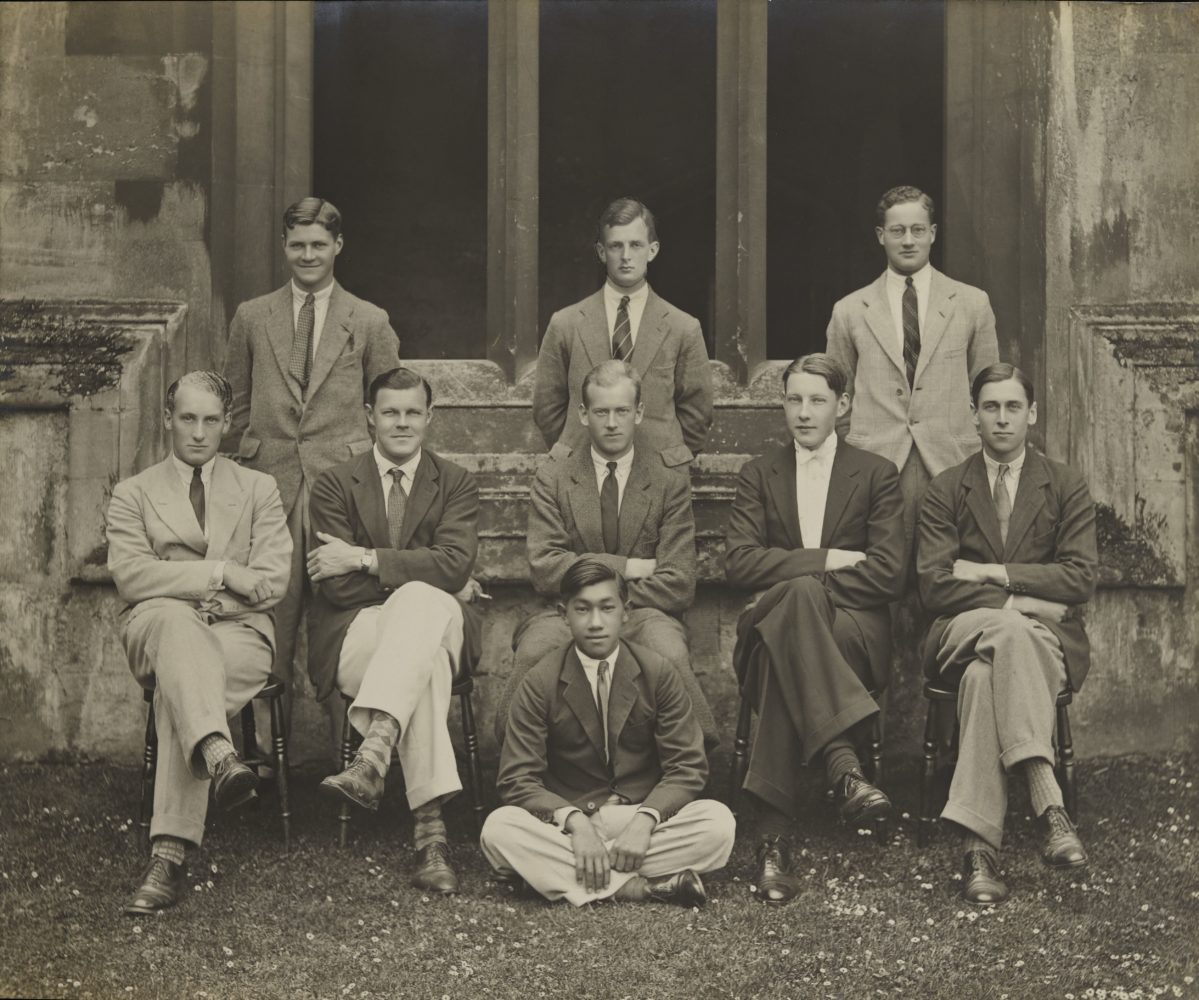

After the First World War, Magdalen College began to move away from its efforts to be a community solely of white students, scholars, and alumni.
The first student of colour who we know graduated from Magdalen arrived in 1920. Saladin Mohumed Younus was the son of an Indian civil servant and had previously studied at the University of Bombai, now Mumbai. After graduating, he qualified as a barrister and was called to the Middle Temple in 1925, before returning to his home city of Hyderabad by 1934.
Student records are sparse for the interwar years, so we know surprisingly little about the lives of most of these international students. Most were from Asia or the Middle East. As boys, they had been educated at English-language independent schools across the British imperial world. Almost all came from wealthy and influential families, often connected to ruling dynasties. Many went on to become academics or diplomats, sometimes returning to their home countries. In this way, the admission of the occasional wealthy international student from across the globe strengthened Magdalen’s elite social status.
The cost and exclusivity of a Magdalen education meant that very few British minority ethnic students were able to study here. As sons of Lebanese immigrants, Albert and Cecil Hourani were pioneers in the mid-1930s, though their family too was prosperous. How much had changed between Hormuzd Rassam’s time at Magdalen in the 1840s and the 1940s?
![A page from the senior common weight book. The signatures of Unosuke Wakamiya and Yoshio Markino appear in the centre of the page in [Roman??] and Japanese.](https://marginalisedhistories.magd.ox.ac.uk/wp-content/uploads/2022/05/O1.A11.1CRO-820x1024.jpg)
![A page from the senior common weight book. The signatures of Unosuke Wakamiya and Yoshio Markino appear in the centre of the page in [Roman??] and Japanese.](https://marginalisedhistories.magd.ox.ac.uk/wp-content/uploads/2022/05/O1.A11.1CRO-820x1024.jpg)
Senior Common Room Weight Book, 21 January 1923
Magdalen has a curious tradition of weighing visitors who come to the Senior Common Room, the social space of the College’s fellows. A stool with a built-in scale is still in use there today. From 1899, fellows recorded names and weights in a Weight Book. This record offers an unusual insight into the academic and social networks of Magdalen fellows.
The Weight Book reveals occasional guests who signed their name in scripts other than the Latin script used by most European languages. This page includes two Japanese guests: Yoshio Markino, an artist and author who lived in London, and Unosuke Wakamiya, a sociologist visiting Britain from Keio University in Tokyo who was known for his anti-Semitism. Other notable guests came from as far as Korea and Guinea-Bissau.
MCA: O1/A11/1
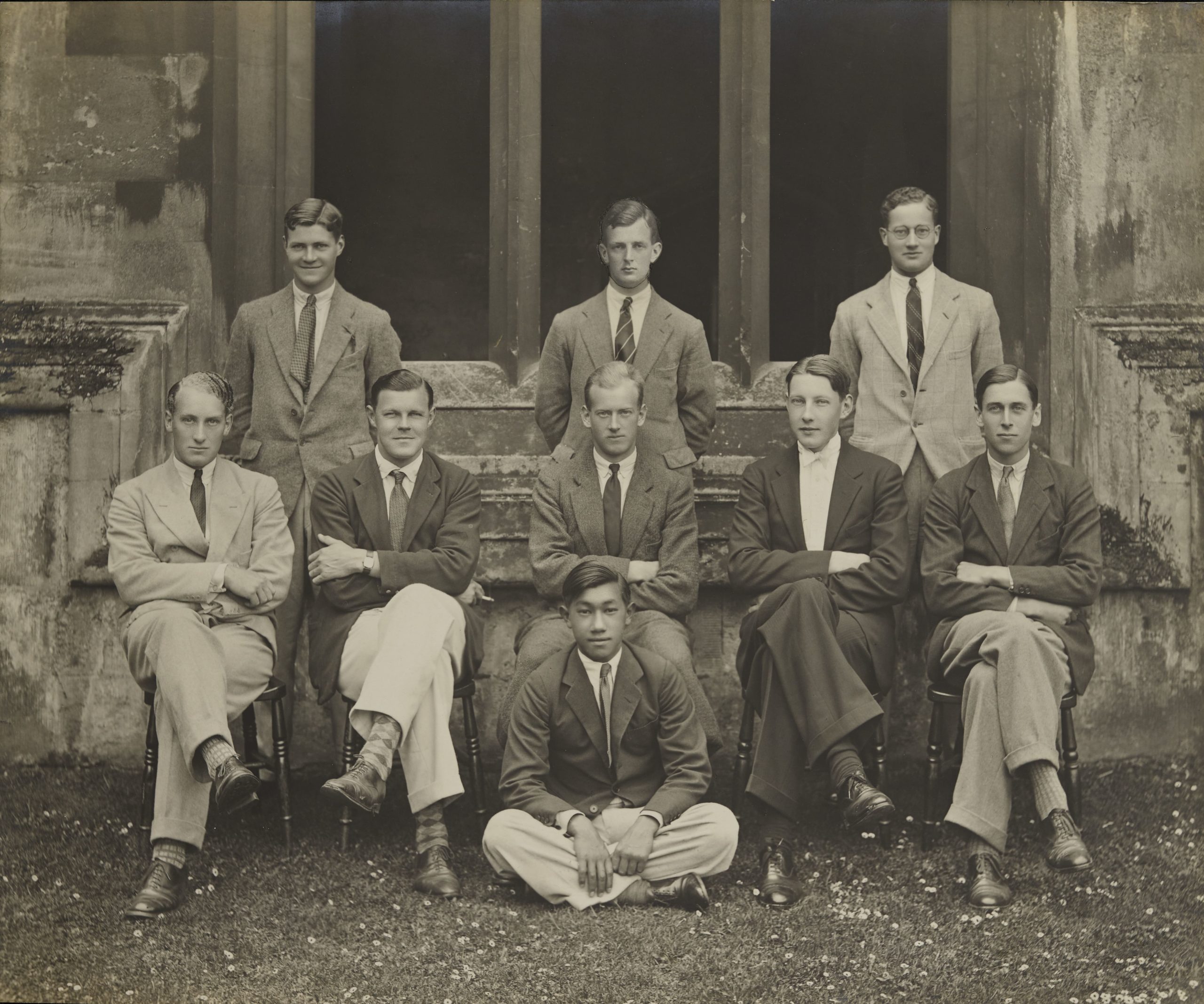
Chaloke Komarakul na-Nagara
Photograph of Magdalen College 1st VIII, 1930
Chaloke Komarakul na-Nagara came to study at Magdalen in 1929. He was from Thailand, but had been educated at St Paul’s, a leading independent school in London. He appears in many rowing photographs. This photo was preserved by Arthur Douglas Dodds-Parker in his album recording the Boat Club’s activities. Dodds-Parker labelled the photo, but Komarakul na-Nagara was the only member of the Boat who remained unnamed.
Chaloke Komarakul na-Nagara went on to cox for the University of Oxford in the Boat Race of 1933 against University of Cambridge. He is likely to have been the first student of colour to compete in the celebrated Boat Race.
MCA: P2/2/1P/1
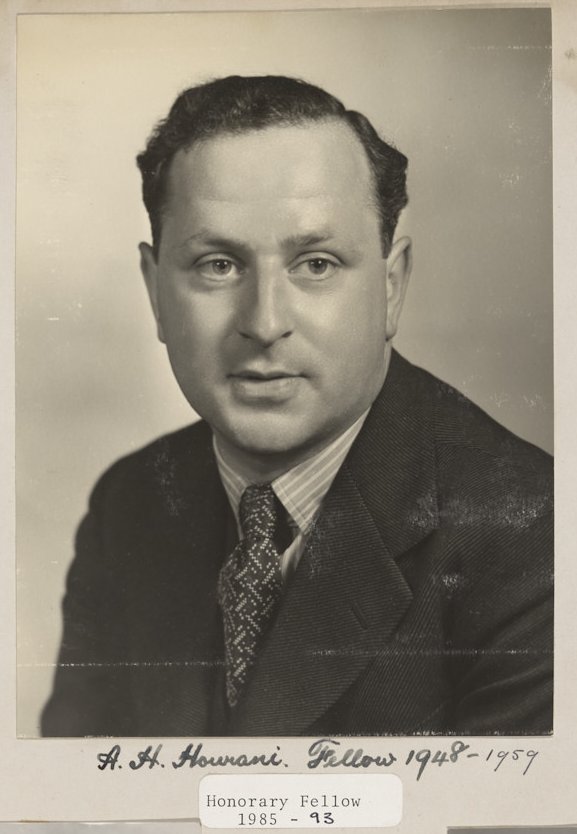

Albert Hourani, Magdalen Senior Common Room photograph album, c. 1948
Very few students who grew up in British minority ethnic families studied at Magdalen in the early twentieth century. Two exceptions came from the same family. Albert and Cecil Hourani were the sons of Lebanese immigrants to Manchester, where their father was a prosperous textiles merchant.
Albert Hourani won a scholarship to Magdalen and came to study Philosophy, Politics and Economics in 1933. On graduating with a first-class degree, he began research for a D.Phil. (PhD). Magdalen awarded him a grant to travel to Lebanon, where he learnt Arabic and taught at the American University of Beirut. After the Second World War, Albert Hourani, unusually, returned to Magdalen as a fellow. This photograph was taken for the fellows’ photograph album.
Magdalen SCR photograph album
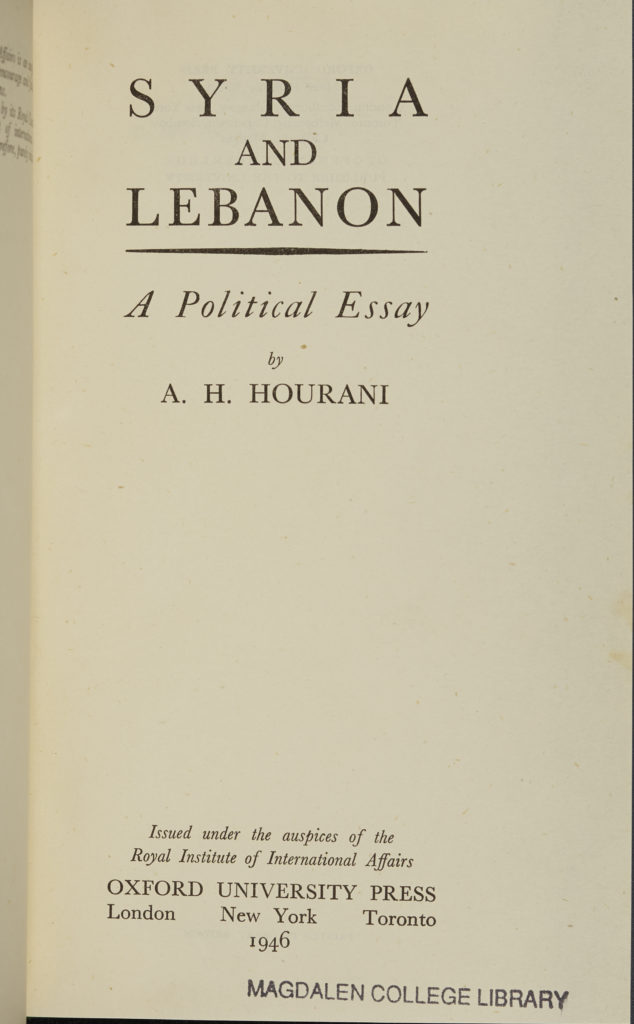

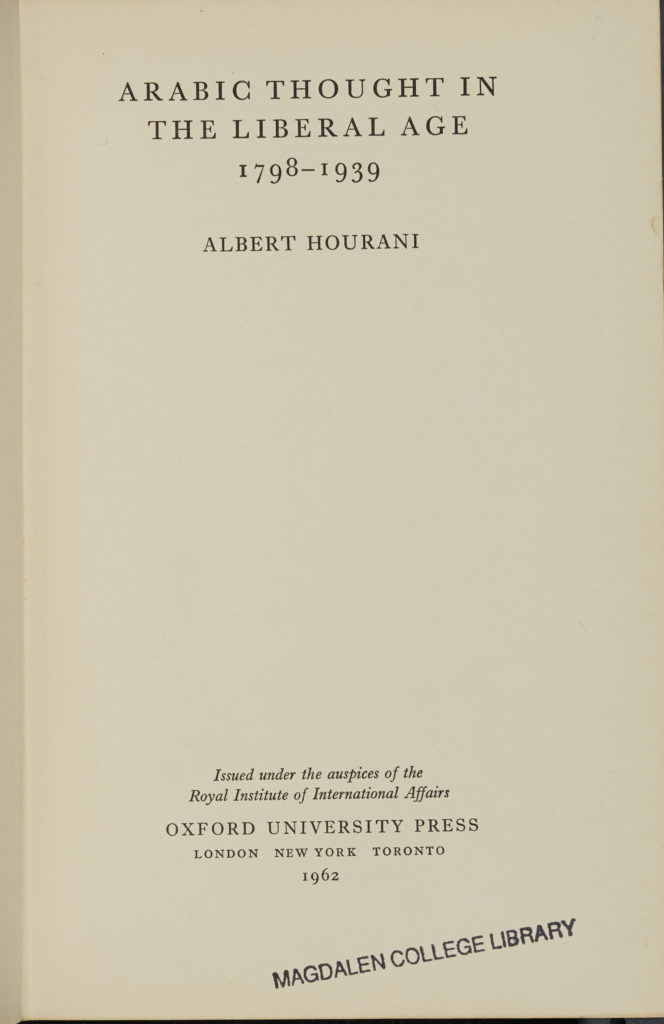
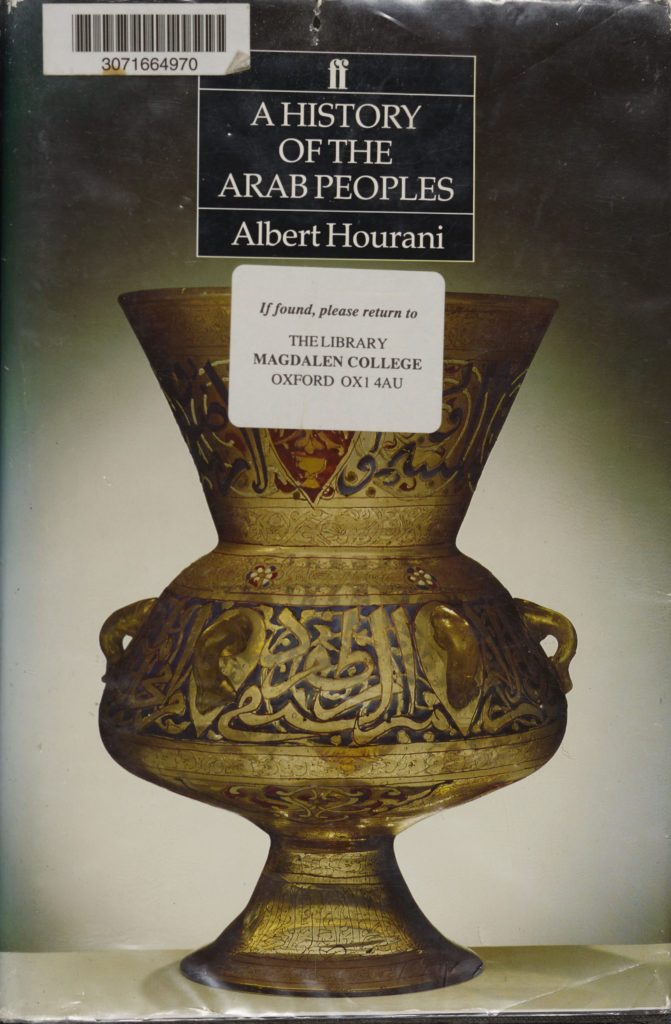
Albert Hourani, Syria and Lebanon: a political essay (Oxford, Oxford, University Press: 1946)
Albert Hourani, Arabic thought in the liberal age, 1798-1939 (Oxford, Oxford University Press: 1962)
Albert Hourani, A history of the Arab peoples (London, Faber and Faber: 1991)
Albert Hourani returned to Magdalen College in 1948 with a prestigious research fellowship. Having served in the Foreign Office and Arab Office, he became the second person in Britain to be appointed to teach Middle Eastern history. Hourani went on to become a leading historian of the Arab World and the first director of the Middle East Centre at St Antony’s College, Oxford. Here you can see a selection of his most ground-breaking publications across his long career.
In his first book of 1946, Hourani set out the principles that underpinned his work, including the need to establish ‘a “healthy” relationship, based upon equality and mutual respect’ between ‘the Arabic-speaking peoples’ and the ‘peoples of the West’.
In the preface to his pioneering book, Arabic thought in the liberal age, 1798-1939, published in 1962, Hourani explained that ‘My greatest debt is to the President and Fellows of Magdalen College, Oxford, who elected me to a research fellowship and so made it possible for me to start the process of thought and study which has led, after much delay, to this book.’
Magdalen College Library
Thus to my earliest memories in Manchester there were two faces: the one Near Eastern, Lebanese, full of poetry, politics and business; the other partly Scottish Presbyterian, full of Sunday churchgoing and Sunday school, partly English through an English nanny and a succession of English and Irish cooks and maids.[12]
Interview with Cecil Hourani, quoted in Abdulaziz A. Al-Sundairi, A Vision of the Middle East: An Intellectual Biography of Albert Hourani, (Oxford: Centre for Lebanese Studies, 1999), p. 18
Interview with Cecil Hourani, Magdalen College, 2017
Cecil Hourani came to Magdalen in 1936. He graduated with a first-class degree in Philosophy, Politics and Economics. The Hourani family home combined Lebanese and British cultures, but their childhood was also marked by discrimination. The Hourani brothers were denied entry to a leading independent school because only ‘English’ boys were accepted, so their father founded his own preparatory school.[11]
Hourani was interviewed by the College in 2017. He spoke of the inspiring lecturers whom he had heard speak, including the philosopher Isaiah Berlin, but also noted that ‘what I really benefited from was the tutorials’. He recalled that studying at Magdalen had been
a great thing in my life and I shall be always grateful for the chance to live here and to study here and to be friends here
You can hear an extract from Cecil Hourani’s interview below.
MCA: OH1 Gaudies 2017 (Cecil.wav)